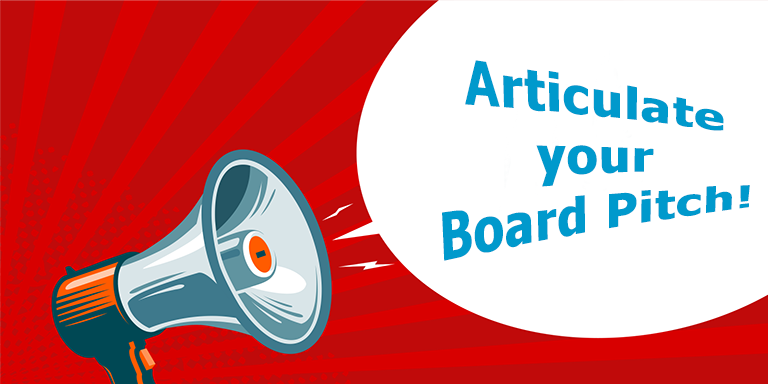Do I need a board resume? Should I write one?

I often get asked, “My executive resume is up to date, so why do I need a Board Resume?” Often, potential board candidates are unaware that a Board Resume is different. It should be a complementary resource that will reinforce in the mind of an appointing organization that you are a strong board candidate. Your Board Resume needs to differentiate you from your competitors and dare them not to interview you.
YES! You must write a Board Resume and include it in every board application
As an ex-board recruiter, I couldn’t tell you how often I received an executive resume from a candidate applying for a board role. This immediately tells me several things:
- #1– that they were not entirely serious about gaining this, or any board position
- #2– that their competitors who had gone to the trouble of writing a dedicated board resume are far more committed
- #3– they had not given proper consideration to how being an executive differs from being a non-executive
- #4– that they did not know their value at the board level.
These elements adversely affect my ability to grade them positively against their competitors, and I am also unlikely to risk my reputation by recommending them to my clients. Having worked with hundreds of boards and board chairs, I can assure you that they typically share the same sentiment.
How does a Board Resume differ from an Executive Resume?
A Board CV or Resume is not the same as an Executive Resume. An executive Resume is crafted to gain a C-Suite role and will use the language, aspirations and referees required to do just that. The executive CV focuses on the individual duties, achievements and successes rather than the more strategic elements required at the board level.
Independent directors are expected to separate themselves from the daily operations of an organization to provide a unique viewpoint, effectively challenge their fellow board members, and furnish relevant insights into strategic matters. Your board resume should provide confidence that you can adapt your thinking and leadership style from a successful executive to an independent board director.
The reader (often the Board Chair) is not interested in how many people you manage or the details of your day job. Instead, they want to know how you can operate on and contribute to their board.
A board resume is less of a static document than your executive resume. It should be continually evolving, requiring you to spend more time keeping it up to date. For most people, applying for board roles will happen far more often than applying for executive roles. You can hold multiple board roles simultaneously, including executive roles, and the tenure of these roles is typically shorter.
Getting your Board Resume past the AI gatekeepers
I can guarantee that at some stage, you will apply for a board role that is listed with a recruitment firm or search firm and/or join a board role-matching website or platform. In most cases, your board application will be uploaded to an Applicant Tracking System (ATS), where it will be filtered and graded based on selection criteria before a human even reviews it. The algorithm will vary depending on the system used. However, they all look for keywords in your documents to determine relevance.
Tips to beat the AI application tracking systems:
- Ensure you customize your board resume and cover letter for every board role.
- Analyze the key selection criteria to determine a list of keywords. Then, ensure you include these keywords in your board resume and cover letter.
- Review the vacancy description and list the required & qualifications, skills and experience. If relevant to you, ensure you include them in your document.
- Ensure your job titles and qualifications are stated in both long-form and acronym formats, e.g., Master of Business Administration (MBA).
- Avoid using tables and non-standard fonts.
- Avoid putting important information in headers and footers.
- Submit all files as a Word document (.docx) unless another format is requested.
Getting your Board Resume past the human gatekeepers
Regardless of who is conducting the board recruitment process (formal or informal), at least one human gatekeeper will always assess your eligibility as a viable candidate for the board seat. These human gatekeepers include recruiters, headhunters, hiring managers, human resources personnel, board members and the board chair. These gatekeepers may assess your application slightly differently, depending on their position in the selection and decision-making process. However, you can only submit one board application and board resume, so you need to ensure that yours will set you apart from others competing for the same position.
Get your board profile right. It must clearly convince the decision-makers “why you should be appointed to this board”.
Recruiters and board chairs take comfort in those who have done the role before. So, if you have been or are an independent board director, make it apparent. If not, articulate what experience you have at board level.
Highlight any Governance Qualifications you have completed and/or prior governance experience. Not only will you be seen as less of a risk, but it also shows your commitment to serving in governance roles.
Ensure your LinkedIn profile is current and accurately represents the information in your Board Resume. I can assure you that recruiters do review candidates’ LinkedIn profiles, and inconsistencies may just be enough to downgrade your board application.
Use action verbs with quantifiable results to show what you did and the effect. Action words create impact, and quantifiable results highlight your contributions, bringing confidence to the reader that you can add value.
How to Write a Board Resume
Based on your knowledge, it’s time to write your first draft. Writing your resume or CV is almost as important as the document itself. In doing so, you will be articulating your successes at board level. This information often remains untapped or forgotten unless written down. Moreover, you will be forced to think about your board pitch – what you do and how it is valuable to boards.
The basic structure or format of your board resume should be as follows:
- Personal information & contact details – I usually recommend that you do not include a photograph of yourself, as it may detract from the content
- Board profile – include examples of successes you have achieved at a company level
- Board & committee experience – list in reverse chronological order
- Executive experience – include any experience at board level or working with boards
- Qualifications – list in reverse chronological order
- Extra professional activities & memberships – that are relevant and have not already been listed
- Referees x 2 – not include contact information (this can be provided upon request).
A final word of advice
Right now, the best advice I can give you is “Don’t get too bogged down in writing your Board Resume or CV”. Don’t get me wrong, it is critical for gaining a board appointment, but it is not the be-all and end-all. Your board resume will become an evolving document that you should customize for every application. Through trial and error, you will make improvements. Sooner or later, whether as part of a formal or informal process, you will be asked for your board resume. Therefore, it must be up to date, compelling, and provide confidence to the reader (and whoever they send it to) that you possess the skills and experience they require.
If you would like me to write your Board Resume or CV personally, it is one of the services I provide to my Board Appointment Coaching Program PLUS members.
Related Articles
Should I use a board recruitment firms
What is an independent board director and what do they do?
About the Author
David Schwarz is CEO & Founder of Board Appointments. He has over a decade of experience in putting people on boards as an international headhunter and recruiter. He has interviewed hundreds of directors and placed hundreds into some of the most significant public, private and NFP director roles in the world.







Hi David. I always enjoy reading your articles,very informative and spot on. Let’s start with putting a winning Board CV: 1.What do you require to Kickstart the process?
2.What is your rate/price?
Franklin, to start the Board CV Writing process, David needs a copy of your current Executive CV. The process of writing your Board CV often takes several drafts before you are both happy with the final version. The service costs $599, but it is included in both our Board Appointment Coaching program packages – https://boardappointments.com/coaching-program/.